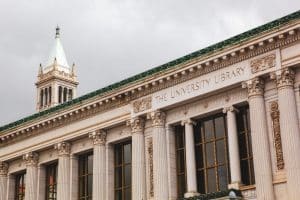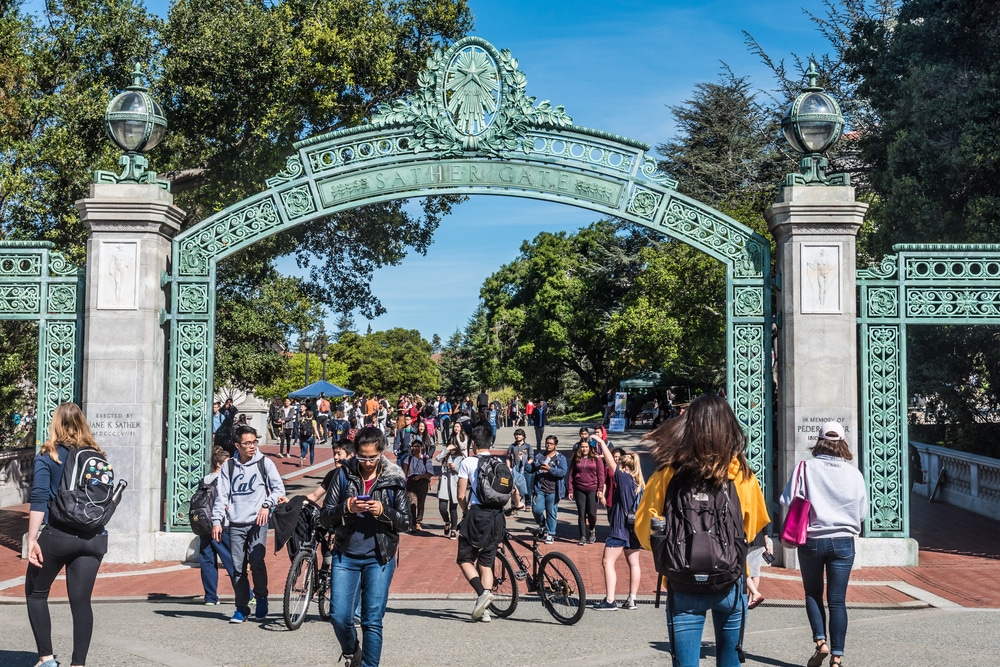Exploring the Classics at Berkeley: A Guide to the University’s Most Iconic Works
The Classics at UC Berkeley is one of the most renowned program in the world for classical studies. With a rich collection of classic works ranging from Ancient Greek to Roman literature, UC Berkeley is a hub of scholarly activity and research in the field.
In this article, we’ll explore Berkeley’s most iconic works of classical literature and art, as well as the history, importance, and future of classical studies at the university.
A Brief History of Classics at Berkeley: How the University Became a Hub for Classical Studies
Classical studies have been an integral part of UC Berkeley’s curriculum since its founding in 1868. As one of the oldest universities in California, Berkeley has a long-standing tradition of excellence in the humanities, particularly in the field of classical studies. Berkeley’s robust collection of classical literature and art has been the result of decades of acquisition and curation by the university’s faculty and staff.
Today, UC Berkeley boasts one of the largest and most impressive collections of classic works in the world.
Throughout the years, UC Berkeley has been home to many renowned scholars and professors in the field of classical studies. These individuals have contributed greatly to the university’s reputation as a hub for classical studies. In addition, the university has hosted numerous conferences and events focused on classical studies, attracting scholars and enthusiasts from all over the world.
UC Berkeley’s commitment to classical studies extends beyond the classroom and academic research. The university has also been involved in various archaeological excavations and preservation efforts around the world, including in Greece and Italy.
These efforts have not only contributed to the preservation of important historical sites and artifacts, but have also provided valuable opportunities for students to gain hands-on experience in the field of classical studies.
The Importance of Studying Classics in Today’s World: A Discussion with Berkeley’s Top Classicists
The study of classics is more relevant today than ever before. As we face new challenges and uncertainties, we can look to the classics for guidance and inspiration. The classics offer timeless insights into human nature, politics, ethics, and culture. We had the privilege of speaking with some of Berkeley’s top classicists, who highlighted the importance of classics in contemporary society.
They emphasized that the classics teach us not just about the past, but also about the present and the future. By studying the classics, we can analyze and interpret the world around us with greater depth and understanding.

One of the classicists we spoke with pointed out that the study of classics can also help us understand the roots of Western civilization. She explained that many of the ideas and values that shape our society today have their origins in ancient Greece and Rome. By studying the classics, we can gain a deeper appreciation for our cultural heritage and the ways in which it has shaped our world.
Another classicist emphasized the interdisciplinary nature of classics. He noted that the study of classics involves not just literature and history, but also philosophy, art, archaeology, and linguistics. This interdisciplinary studies can help us develop a more holistic understanding of the world and the complex systems that shape it.
By studying classics, we can learn to think critically and creatively, and to approach problems from multiple perspectives.
The Top 10 Must-See Classic Works at Berkeley: From Ancient Greek to Roman Literature
With such an expansive collection of classics, it can be challenging to know where to begin. Here are the top 10 must-see classic works at UC Berkeley:
- The Iliad by Homer
- The Odyssey by Homer
- The Aeneid by Virgil
- The Histories by Herodotus
- The Republic by Plato
- The Politics by Aristotle
- The Confessions by Saint Augustine
- The Divine Comedy by Dante Alighieri
- The Canterbury Tales by Geoffrey Chaucer
- The Prince by Niccolò Machiavelli
This list represents just a small selection of the classics available at Berkeley. We encourage you to explore the university’s collection in greater depth.
One classic work that is not on this list but is still highly recommended is Ovid’s Metamorphoses. This epic poem tells the stories of various mythological transformations, from the creation of the world to the deification of Julius Caesar. It is a fascinating and entertaining read that showcases Ovid’s skill as a storyteller and poet. If you have the chance, be sure to check it out from Berkeley’s classics collection.
Behind the Scenes: An Insider’s Look at the Preservation and Restoration of Berkeley’s Classic Works
Preserving and restoring classic works is a critical aspect of Berkeley’s mission. We spoke with the university’s preservation and restoration team, who shared some of the challenges they face in maintaining such a vast collection. They highlighted the importance of proper storage, handling, and cataloging in ensuring the longevity of the classics.
Berkeley’s team of experts is dedicated to preserving and enhancing the university’s collection for generations to come.
One of the biggest challenges faced by the preservation and restoration team at Berkeley is the constant threat of environmental damage. Exposure to light, humidity, and temperature fluctuations can all have a detrimental effect on classic works. To combat this, the team has implemented strict environmental controls in storage areas and uses specialized equipment to monitor conditions.

In addition to environmental concerns, the team also faces the challenge of preserving works that are in a state of disrepair. This often involves delicate and time-consuming restoration work, which requires a high level of skill and expertise. The team works closely with outside experts and conservators to ensure that restoration work is carried out to the highest standards.
The Impact of Classics on Modern Literature and Art: A Discussion with Contemporary Artists and Writers
The influence of classics on contemporary literature and art is undeniable. From reimagining classic characters and themes to incorporating classic motifs and forms, artists and writers continue to be inspired by the classics. We spoke with several contemporary artists and writers who shared their thoughts on the relationship between classics and modern culture.
They credited the classics with shaping their worldview and artistic style, and emphasized the continued relevance of classic works in today’s society.
One of the artists we spoke with explained how she often incorporates classical elements into her work. She described how she draws inspiration from the intricate patterns and designs found in ancient Greek pottery, and how she uses these motifs to create unique and visually striking compositions.
She also spoke about the importance of studying classical art and literature in order to fully appreciate and understand the cultural context in which her work exists.
Exploring the Intersection of Classics and Technology: How Berkeley is Using Digital Tools to Enhance Study and Research
Technology has revolutionized the study and analysis of classics. Berkeley is at the forefront of this digital revolution, using advanced tools and techniques to enhance scholarly research and engagement with classic works. We spoke with some of Berkeley’s technology experts, who shared their strategies for using digital tools to enhance classic studies.
They emphasized that digital technologies offer new opportunities to engage with classic works, whether through virtual reality tours of ancient sites or digital models of key works.
One of the key benefits of using digital tools in classic studies is the ability to access and analyze large amounts of data quickly and efficiently. With the help of digital tools, scholars can now analyze texts and artifacts in ways that were previously impossible.
For example, they can use text mining techniques to identify patterns and connections between different works, or use 3D modeling software to create detailed reconstructions of ancient buildings and monuments.
Another advantage of using digital tools in classic studies is the ability to collaborate and share research with scholars from around the world. Digital platforms such as online databases and social media networks allow scholars to connect and share their work with a global audience, facilitating new collaborations and interdisciplinary research projects.
This has led to a more diverse and inclusive approach to classic studies, with scholars from different backgrounds and disciplines coming together to explore the rich history and culture of the ancient world.
A Journey Through Time: The Evolution of Classic Works at Berkeley from the 19th Century to Present Day
Berkeley’s collection of classic works has evolved significantly over the past century and a half. We traced the history of the university’s collection from its early days to the present day to highlight the key turning points and developments that have shaped it. From early acquisitions by founding faculty members to recent additions of rare manuscripts and artworks, Berkeley’s collection reflects the changing trends and priorities of classical studies over time.
One of the most significant turning points in the evolution of Berkeley’s collection was the establishment of the Classics Department in the early 20th century. This led to a renewed focus on acquiring original texts and manuscripts, as well as a greater emphasis on interdisciplinary research and collaboration with other departments.

In recent years, the collection has continued to expand and diversify, with a particular focus on incorporating works from
underrepresented voices and perspectives. This has included the acquisition of works by women, people of color, and LGBTQ+ authors, as well as a greater emphasis on non-Western classical traditions.
The Role of Classics in Shaping Society: A Look at How Berkeley’s Classic Works Have Influenced Politics, Philosophy, and Culture
The classics have played a significant role in shaping society and culture, both in the past and present. We spoke with several Berkeley
faculty members who discussed how classic works have influenced everything from political systems to moral philosophy. They emphasized that the classics offer a rich source of ideas and inspiration that can help us navigate the complex issues and challenges of contemporary society.
One of the faculty members we spoke with highlighted the impact of ancient Greek and Roman literature on modern political thought. She explained how works such as Plato’s “Republic” and Aristotle’s “Politics” have influenced the development of democratic systems and the concept of citizenship.
She also noted that the classics have been used to justify political ideologies throughout history, from the Roman Empire to the Enlightenment.
Rediscovering Forgotten Classics: Spotlight on Lesser-Known Works at Berkeley’s Libraries and Archives
While many classic works are well-known and widely studied, there are numerous hidden gems to be discovered in Berkeley’s collection.
We spoke with several librarians and archivists who shared their favorite lesser-known classics and discussed why they are worthy of attention. From obscure ancient texts to forgotten medieval manuscripts, Berkeley’s collection is full of surprises.
One of the librarians we spoke with highlighted a lesser-known work by a well-known author. The book, titled “The Sea and the Mirror,” was written by W.H. Auden and is a response to William Shakespeare’s play “The Tempest.” The librarian explained that while many people are familiar with “The Tempest,” few are aware of Auden’s response to the play.
The book offers a unique perspective on Shakespeare’s work and is a fascinating read for anyone interested in literature and literary criticism.
Navigating the Collection: Tips for Making the Most Out of Your Visit to Berkeley’s Classics Department
With such a massive collection of classic works, it can be overwhelming to know where to start. We spoke with Berkeley’s library staff, who offered tips and strategies for navigating the collection and making the most out of your visit. Whether you are a seasoned scholar or a curious newcomer, their insights will help you discover new and exciting aspects of Berkeley’s vast collection of classic literature and art.
One of the key tips offered by the library staff is to start with a specific area of interest. Rather than trying to tackle the entire collection at once, focus on a particular author, time period, or genre that you are passionate about. This will help you narrow down your search and make your visit more productive.

Additionally, they recommend utilizing the library’s online catalog and resources to plan your visit ahead of time and make the most out of your time in the Classics Department.
Celebrating Diversity in Classics: Highlighting Non-Western Works in Berkeley’s Collection
The classics are often associated with Western literature and culture, but Berkeley’s collection also includes a wealth of non-Western works. We spoke with several faculty members who highlighted the importance of studying non-Western classics and sharing them with a wider audience.
They emphasized the rich diversity of culture and ideas represented in Berkeley’s collection, and the insights that can be gained from looking beyond the traditional canon of Western classics.
One of the faculty members we spoke with pointed out that the study of non-Western classics can challenge our assumptions about what constitutes “classic” literature. She noted that many non-Western works have been overlooked or undervalued due to cultural biases and Eurocentric perspectives.
By studying these works, we can broaden our understanding of what constitutes a classic and gain a more nuanced appreciation of the literary traditions of different cultures.
Another faculty member emphasized the importance of including non-Western classics in the curriculum to provide a more inclusive and representative education. She noted that students from diverse backgrounds may feel excluded or marginalized when the curriculum only focuses on Western classics.
By incorporating non-Western works, we can create a more welcoming and inclusive learning environment that reflects the diversity of our society.
The Future of Classical Studies at Berkeley: A Look Ahead to Upcoming Research Projects, Exhibitions, and Collaborations
As classical studies continue to evolve and adapt to new challenges and opportunities, Berkeley is at the forefront of innovation and exploration. We spoke with several faculty members and researchers who shared their plans and visions for the future of classical studies at Berkeley.
From collaborations with other universities to cutting-edge research projects, there are countless exciting developments on the horizon for classical studies at UC Berkeley.
One of the upcoming research projects in classical studies at Berkeley is focused on the study of ancient Greek and Roman medicine. This interdisciplinary project involves collaboration between classicists, historians, and medical professionals to explore the medical practices and beliefs of the ancient world.
The project aims to shed light on the ways in which ancient medicine influenced modern medical practices and to provide new insights into the history of medicine.
From Student to Scholar: A Guide on Pursuing a Career in Classical Studies with a Degree from UC Berkeley
For many students, studying classics at Berkeley is just the beginning of a lifelong journey of scholarly exploration and discovery. We spoke with several graduates of Berkeley’s classics program who shared their experiences and insights on pursuing a career in classical studies.

They discussed the diverse range of career paths available to classicists, from academia to public service to journalism, and offered tips and advice for aspiring classical scholars.
One of the graduates we spoke with shared her experience of transitioning from a career in law to classical studies. She explained how her background in law gave her a unique perspective on the ancient legal systems of Greece and Rome, and how she was able to apply this knowledge to her research on the intersection of law and literature in ancient texts.
She emphasized the importance of interdisciplinary studies in classical studies, and how a background in fields such as law, philosophy, or political science can enhance one’s understanding of the ancient world.
Engaging the Community Through Classics: How Berkeley is Promoting Public Interest in Classic Literature and Art through Outreach Programs
As a public institution, Berkeley has a responsibility to share its collection with the wider community. We spoke with several faculty members and staff who discussed Berkeley’s outreach initiatives and strategies for promoting public interest in classic literature and art.
From public lectures to community events to online resources, Berkeley is dedicated to fostering greater understanding and appreciation of classic works beyond the walls of the university.
We hope this guide has been informative and helpful in exploring the classics at UC Berkeley. Whether you are a seasoned scholar or just starting out, Berkeley’s collection offers a wealth of opportunities for learning, discovery, and inspiration. So why not start your own journey of exploration today?



































